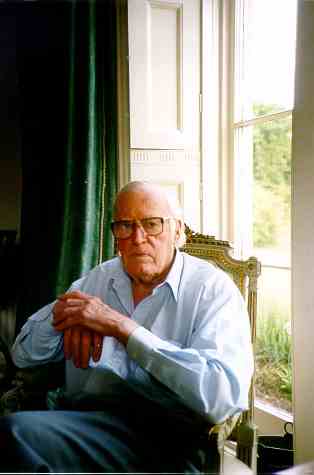RICHARD ARNELL AT 88
 It's
a quiet room in a leafy street in Bromley
but Richard Arnell is talking about
a kaleidoscope of experience that is
simply dazzling. Richard Arnell, 88
in September 2005, joined residents
at the Musiciansí Benevolent Fundís
Ivor Newton House at the start of the
year. He has been described as Britain's
greatest living symphonist and his output
has been prolific: as well as his seven
symphonies, his work includes ballet
scores, violin concertos, works for
piano, organ and harpsichord, six string
quartets and extensive film music. .
It's
a quiet room in a leafy street in Bromley
but Richard Arnell is talking about
a kaleidoscope of experience that is
simply dazzling. Richard Arnell, 88
in September 2005, joined residents
at the Musiciansí Benevolent Fundís
Ivor Newton House at the start of the
year. He has been described as Britain's
greatest living symphonist and his output
has been prolific: as well as his seven
symphonies, his work includes ballet
scores, violin concertos, works for
piano, organ and harpsichord, six string
quartets and extensive film music. .
Born in Hampstead,
he studied composition at the Royal
College of Music with John Ireland from
1935 until 1939 when he moved to New
York.
WQXR, the first radio
station in the US to specialise in classical
music, broadcast his Classical Variations
for strings on New Year's Eve, 1939.
This was followed by a performance of
his Overture: New Age at the
Carnegie Hall in 1941. "That was the
beginning," he says.
He remembers how Sir
Thomas Beecham took him up after Virgil
Thomson, the composer and revered New
York Herald Tribune critic, told him
about Arnell. Sir Thomas became an ardent
admirer of his work and gave him eight
premieres in New York and London including
the ballet suite, Punch and the Child
which was commissioned by the Ballet
Society of New York.
Arnell recalls life
in the US with affection. He worked
as an air raid warden in Jackson Heights,
New York, during the war where he forged
a close friendship with the then emerging
artist Mark Rothko. He was music consultant
to the BBC's North American Service
from 1943 to 1945.
"I've met all sorts
of people," he says. "Charlie Chaplin
in Los Angeles at the performance of
my ballet Harlequin. I conducted
the performance and afterwards he came
on to the stage and congratulated me."
Arnell started to write
for film with the score for.The Land,
the film produced for the US Dept
of Agriculture in 1941 by the pioneering
documentary film maker Robert Flaherty,
famous for Nanouk of the North. Arnell
has subsequently become a noted authority
on film music.
He moved back to England
in 1947 and taught composition for many
years at Trinity College of Music. He
has lectured at the Royal Ballet School,
edited The Composer, chaired
the Composers' Guild of Great Britain
and been Musical Director and a board
member of the London International Film
School.
But he retains a strong
attachment to the States and fittingly
this October, Warren Cohen's Musica
Nova Orchestra in southern Arizona will
embark on a plan to play all of his
Symphonies to create the first commercial
recordings of them for the new UK-based
Toccata Classics label.
"We will be performing
the Third Symphony all 62 minutes of
it - in our season opening concert on
8 October," he told the key. An
excerpt from Arnell's Fifth Symphony
plays on visiting www.musicanovaaz.org
Toccata
Classics was launched this autumn
and is distributed through Naxos. "The
whole idea behind the new label is to
concentrate on music that deserves to
be on CD but hasn't got there yet."
says founder and Managing Director Martin
Anderson. "The first CD of Arnell's
Symphonies will be available next year.
It's just the sort of thing we started
the label to do."
Back in Bromley, Arnell
describes himself as a poet as well
as a composer. He wrote all of his own
libretti and published a book of poetry,
Not Wanted on Voyage, in 2001.
He's still composing and has a variety
of future projects in mind.
Mark Rothko, he points
out, once asked him to compose a brass
quintet for him.
"One of these days,"
he says, "one of these days."
© Susan Roberts
With thanks for permission to reproduce
this article to the Musiciansí Benevolent
Fund which was originally published
in The Key Summer 2005. www.mbf.org.uk.
(Photograph © Avril Curzon 1997)
see also David
Wright's profile

